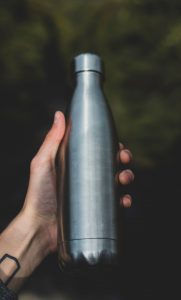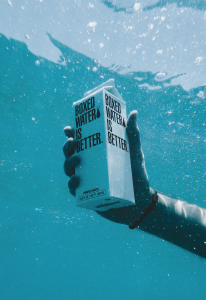Is Water Still the Number One Way to Hydrate?

We’ve all heard of the superfoods and superfruits found deep in the rainforests and coral reefs, claiming to cure everything from cancer to acne. Yet nothing comes close to the classic and ancient miracle that is WATER! With the onslaught of colorful energy drinks, sparkling water and diet sodas, clear cut water becomes less tempting and attractive. This becomes clear when looking at the fact that the average American only consumes a third of the amount of water needed to reap the health benefits of hydration. Let’s get the facts straight concerning how much water you actually need and how it helps you more than any energy drink ever could.
How Does Your Body Use Water?

First, let’s briefly go over water’s four MAIN jobs:
- Regulating body temperature.
- Carrying nutrients and oxygen to all cells.
- Protecting sensitive tissues like the spinal cord, by lubricating joints.
- Removing waste through urination, bowel movements, and perspiration.
It seems like water does A LOT for our body, and we’ve all heard that humans are made up of 60% water, generally speaking. Specifically, here is a water percentage breakdown in the body:
| Body part | Water percentage |
| brain and heart | 73% |
| lungs | 83% |
| skin | 64% |
| muscles and kidneys | 79% |
| bones | 31% |
Given that water goes to so many places and has various functions, it almost seems impossible to drink as much as we need. Allow me to help lighten the load by helping you calculate how much water intake you need, as well as let you in on all the great sources of hydration!
How Do You Know How Much Water You Need?
The science on water intake has been lacking until recently, and there is still some debate on what amount is best for the average, healthy individual. With the repercussions of insufficient water intake causing dehydration, which leads to unclear thinking, mood swings, constipation, kidney stones, hypothermia, heart failure, and ultimately death, we need to get the amount right. Luckily it’s not rocket science, many doctors claim that most healthy people can simply let thirst be their guide when it comes to water intake. However, with the influx of sugary and caffeinated drinks these days, your body can be easily fooled. The Food and Nutrition Board provides basic, yet general recommendations for water: women need approximately 2.7 liters (91 ounces) of water daily, and men, an average of approximately 3.7 liters (125 ounces). A simple formula to keep your specific needs covered is to drink 3/4 ounces of pure, filtered water per pound of body weight. So for instance, a healthy 145 pound person should intake about 108 ounces, or 13.5 cups of water daily.
Where Should You Get Your Water From?

Now that you know how much water to consume, let’s find the best water sources. These days it is so important to filter your water, and the best way to do that is to first test your water supply to see which contaminants you should be most concerned with. One of the best ways to filter your water is through Reverse Osmosis, which is usually accompanied by a carbon filter to ensure the removal of many unwanted materials and chemicals like lead, chlorine, and parasites. There has been some hype recently on alkaline and pH balancing water, yet the Mayo Clinic has stated “regular water is best for most people”. The few studies available to support the health benefits of alkaline water were conducted with a small number of people, claiming to have anti-aging and blood pressure lowering benefits. However, regular filtered water is already alkaline with a pH level of 7-8, and has the same benefits. Upping your intake of fruits and veggies is a delicious way to increase your fluid, nutrient, and antioxidant intake. For instance, Zucchini is 94% water and Strawberries are 91% water.
What To Take Away…
Being fully hydrated allows your body to operate at an optimum level. Your organs and tissues get the fluid they need, your metabolism is at peak performance, and you’ll be able to get the most out of your workout. Drinking pure, filtered water and ensuring you are eating plenty of fruits and veggies will provide you with a multitude of minerals and antioxidants, as well as fill you up to better avoid unhealthy foods and beverages. Be sure to get your water supply tested to avoid consuming any harmful chemicals, and make the effort to meet your daily water intake needs to reach your best health!
Written by: Trainers of Bare Health Carla and Armando Castro
Sources:
- https://www.cdc.gov/healthywater/drinking/nutrition/index.html
- https://www.cdc.gov/nutrition/data-statistics/plain-water-the-healthier-choice.html
- http://www.nationalacademies.org/hmd/Reports/2004/Dietary-Reference-Intakes-Water-Potassium-Sodium-Chloride-and-Sulfate.aspx
- https://www.healthline.com/health/body-water-percentage#body-water-function
- https://www.webmd.com/diet/features/water-for-weight-loss-diet#1
- https://www.cdc.gov/healthywater/drinking/public/water_quality.html
- https://www.healthline.com/health/food-nutrition/alkaline-water-benefits-risks
- http://en.cnki.com.cn/Article_en/CJFDTOTAL-SHYI200112005.htm


